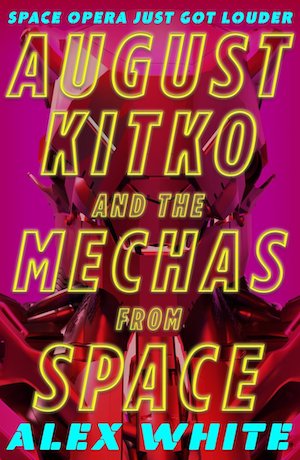It’s the year 2657 and August “Gus” Kitko is a jazz pianist with a front seat to the end of the world. Like the string quartet playing a swan song on the deck of the sinking Titanic though, he’s doomed not to live out his last days with friends, or family, or even in the comfort of his own home, but at a lavish party hosted by Earth’s richest. At the estate of Lord Elisa Yamazaki in Monaco, Gus is the hired entertainment for a victory party meant to celebrate the Dictum, a warship designed to eliminate the alien mechas, or Vanguards that have for years now threatened the extinction of humanity.
Of course, the Dictum is only a symptom of the United Worlds goverment’s giant hubris; it’s cast aside in the first battle like scrap metal, leaving only hours for the Vanguards to regroup before they inevitably commit intergalactic genocide. Gus is left amongst insipid apocalypse partiers drinking their last hours away. Standing at the edge of a cliff, he wonders if he should take his own life before he’s casually slain. Only of course, the fall might not kill him and he’d be leaving his half-dead body to the mercy of marine life or seagulls, and as we can all concur, “seagulls are assholes.”
Believe it or not, all of this occurs in the first few pages of August Kitko and the Mechas from Space, a rapidly shifting stunner of a space opera novel that is more delightful whiplash than languidly-paced tragedy.
Unlike others of the genre, that can sometimes risk putting sentiment aside for an orgy of technological detail, there’s nothing thin, artificial or glossy about it. Rendered with Alex White’s panoramic description, humor and kaleidoscopically lurid prose, this is a book that manages to capture the surprising micro-emotions of living through crisis without sacrificing twisty, ambitious arcs of plot.
After all, it’s the fault of a mind-blowing, last-minute hookup with pop-rock guitarist and star Ardent Violet that Gus keeps off the ledge long enough to encounter the rebel Vanguard, Greymalkin, who, contrary to its orders, wants to save humankind from its unceremonious end. Hilariously enough, Greymalkin seems to have more respect for Gus’ artistry than the other guests at the party, who know him only as the guy whose piano piece got remixed into a mainstream hit. It’s Gus’ sitting down at the piano and hitting the F Dorian key in an attempt to to die doing what he loves, that causes Greymalkin to recruit him as a Conduit, a sort of translator for Vanguards (who communicate through musical variations), as a first step towards saving the world.
Spoilers follow
Buy the Book


August Kitko and the Mechas from Space
In this universe where queerness appears to be widely and unquestioningly accepted—Ardent is nonbinary and referred to as Gus’ ‘joyfriend’—there’s much pleasure for the reader in a hot and heavy romance that doesn’t shy away from queer physicality and bluntly horny attraction. Not to mention, there are fancy technologies in the novel that offer the kinds of at-will appearance changes and body modifications that, let’s face it, we’d all kill for. Ardent’s Ganglion UI bracelet provides hair, retinal and clothing options that satisfied my hunger for avant garde, futuristic fashion, while the details of their life as a celebrity allowed me to revel in the possibilities for a fully automated luxury space lifestyle.
But queerness here isn’t simply an aesthetic, it’s also functional and protective—multiple times, Ardent’s fashion forms makeshift armor that literally saves them from injury, or aids them in keeping others alive. And body technology can be affirmative, but its darker side rears its head in the context of Gus and later, Ardent, serving as Conduits to the Vanguards. Neither magically becomes some kind of ideal superweapon. Instead, their new abilities come at a cost. In order to sync with mecha systems, both protagonists undergo an arduous process of surgical implantation, irreversibly altering their bodies with alien prostheses that will shorten their lives by a third. White sensitively details how Gus and Ardent grapple with these invasive changes alongside medical/state institutions, reflecting the traumas and dissociations that non-normative bodies are forced to hold when placed within the constraints of our larger society.
Crucially though, this suffering is also a galvanizing force. Rather than any heroic impulse, it’s Gus’ suicidal ideation, his grief at losing bandmates and chosen family, in addition to the news of his curtailed lifespan that allows him to fight for humanity without fear of certain death. “That’s your mistake,” he informs the Infinite, mastermind behind the Vanguards, “thinking I was so attached to life in the first place.” Notably, despite their same adverse circumstances, Gus and Ardent respond differently (valid!) and change within their blossoming relationship—Gus lets himself be cared for and hope, Ardent lets their less performative self be seen. Despite the novel’s semi-idyllic setting, White is still able to explore the dimensional difficulties of queerness, sickness and love—by demonstrating how these experiences can make valuable contributions to survival and resistance strategies, and teach us how to better live, fight and find joy even when we already know how things will end. Which is uh, badly. “We might live in a tragedy, but we still deserve happiness. Someone has got to do it,” Ardent shrugs.
In August Kitko and the Mechas from Space, queerness sure does provide you with important skills to bring to the apocalypse table, but so does art. “Seven years of rocking packed arenas have given them fantastic cardiovascular health. Running from Ghosts is way easier than the dance number they had planned for the victory party,” Ardent remarks with glee. With musical ability being the primary skill that allows Conduits to interface with their Vanguards, we’re introduced to other Conduits who round out the band, Nisha Kohli, a vocalist in her family’s ra¯ga outfit and Hjalmar Sjögren, an experimental metal drummer. Much of the delirious, cinematic quality of White’s prose comes from an intimate knowledge not just of music’s technicalities, but how it feels to make it together, as a collective activity that requires instinct as well as intentional teamwork; is a mode of connection as much as it is possesses political energy to be harnessed. Music, for White, is not simply a party or propaganda, but a multifaceted means towards different forms of power. It’s the foundation of Ardent and Gus’ sustaining romance; it’s how the Conduits learn to effectively work together in battle (via an incredible jam session in a recording studio); it’s a connection to the Fount, a database of collected universal knowledge that allows Conduits to gain skills.
And it’s each character’s orientation to music that gives us key information about their individual motivations and ideologies. Nisha isn’t an acclaimed musician like the rest, but her approachable spirit reflects her straightforward desire to protect and her ability to rally supporters. Ardent is an icon at heart, narcissistic and showy, but genuinely dedicated to their craft and passionate about those devoted to them. Gus’ isolated melancholy is a feature of the underlooked, nerdy virtuoso who needs a band and its sociality in order to ground him in reality. Indeed, a strength of August Kitko and the Mechas From Space is that saving the world isn’t purely an altruistic project so much as the believable, relatable sum of these characters’ idiosyncratic, sometimes selfish desires. Like Gus, I don’t think it’s so wrong to just want another few days to see where things will go with a new, sexy lover. Like Ardent, I don’t hate the idea of being revered by fans for my accomplishments, whether that’s a new album or slaying an enemy Vanguard. Similarly, the rebel Vanguards are no monolith—Falchion, Ardent’s Vanguard contemptuously views humanity as a parasite, but is curious about what might happen if it keeps it around, whereas Gus’ Greymalkin seems more ethically motivated, torn about the whole murder part of the equation.
We don’t get all the answers at the end of August Kitko and the Mechas From Space—after all it’s only the first movement of the The Starmetal Symphony trilogy, with plenty to come. I’m left with lingering questions: about what exactly each rebel Vanguard is fighting for, and about what the Infinite’s plans are for the war it wages as it carves a destructive path through space. But White’s worldbuilding is subtle and meticulous, leaving us glimmers of background context that I find fascinating—the fact that self-made ecological disaster is what’s caused humans to conduct a massive colonization of space; the suspicious presence of the Veil, instituted by the government to cut off communication between Earth and other colonies in fear that missives might be intercepted and manipulated by alien forces. Not to mention the Ghosts, uncanny beings under Vanguard control that vampirically drain their victims’ memories in order to assume the form of the human dead.
Ultimately, August Kitko and the Mechas From Space is an explosive, sensory introduction to a world full of intergalactic drama and exhilarating romance that’s ripe for bringing speculative critique into focus—I’ll be looking forward to more.
August Kitko and the Mechas From Space is published by Orbit.
Trisha Low is the author of The Compleat Purge (Kenning Editions, 2013) and Socialist Realism (Emily Books, 2019). She lives in the East Bay of California.










